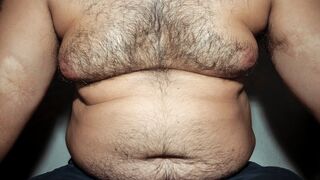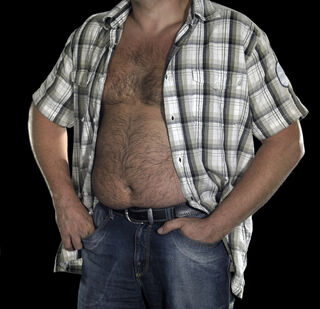Diet
You Don’t Need to Tell Me I’m Fat
A Personal Perspective: You don’t think a large man knows he is fat?
Posted April 4, 2022 Reviewed by Lybi Ma
Key points
- Men are not exempt from worrying about their weight.
- Fat men are thought of as lazy, unmotivated, and lacking in self-discipline.
- Some men sacrifice their health to obtain the idealized body type.
- Dieting can have a negative impact on mood.

At my high school reunion, a classmate said to me, “Loren, you’ve gotten so . . .” and after a beat, she exclaimed, “big!” I’d like to say it didn’t hurt, but more than 10 years later, here I am writing about it. Did she really think she needed to remind me?
The last time I had an acceptable body weight and body mass index (BMI), I ran six miles three to four times a week, and on alternate days I biked 30 miles. I couldn’t sustain it. I always felt hungry, and I was angry at others who seemed to maintain their weight without sacrifice.
Those who believe men are exempt from body image issues are flat-out wrong. Big men are their own harshest critics.
Muscles and masculinity
Prior to World War II, most Westerners tended to consider any preoccupation with men’s bodies to be effeminate. Society measured our attractiveness on achieving financial success, showing confidence, being one of the guys, and being tough enough to take a beating. Research on men’s bodies was scanty.
As Western culture evolved, fat men were considered lazy, unmotivated, lacking in self-discipline, sloppy, and inadequate. Biases against weight result in discrimination in employment, healthcare, and education. But the damage to our self-esteem is what traumatizes us the most.

Many gay men say that even if their BMI is healthy, they don’t feel normal by gay standards. When compared to heterosexual men of the same size, gay men are more likely to be ignored, treated rudely, or mocked. They feel beaten down and cast aside.
Assessment of our bodies includes not only muscle and fat composition but also our emotional response to our bodies and confidence about our attractiveness. We measure our own body against an internalized image of the idealized body.
The ideal man is strong and athletic, V-shaped, with leanness and muscle definition. In one study, college men wanted 25 more pounds of muscle and eight pounds less body fat. They valued this ideal more than their health and well-being.
I had man boobs, and I hated mine. As a teenager, I hated exposing my naked body to anyone, so I always showered in a corner facing the wall. Breasts are feminine, and I felt my fleshy breasts excluded me from the world of masculinity. I was ashamed of the physical evidence that showed I wasn’t the man I wanted to be. I empathize with trans men who bind their breasts and yearn for surgery.
Diets are depressing
Folks tell overweight people, “All you have to do is eat less and exercise.” If all it took to maintain an ideal weight is to eat less and exercise more, a greater number of people would be successful at it. The problem is far more complicated than that.
To lose significant amounts of weight, you need to become obsessed with it—every thought centers on your diet. Every conversation leads to a discussion about diet and exercise. I felt two-dimensional.
Dieting makes you irritable, and you don’t like that about yourself. You want to do something, anything, that will give you some relief. Often that temporary relief comes in a bag of cookies. And then comes the guilt.
To do the work necessary to lose weight means we have to continuously deny ourselves the things we love. To deny ourselves those things, we must believe that a brighter future lies ahead if we reject them. What if you stop believing that a brighter future lies ahead?
Is depression a cause or an effect? The answer is both. We eat to lose the pain of loneliness, and then the added weight makes us want to isolate. Then we begin to feel hopeless that we have any future.
Believing you’re beautiful
Many people believe, “No one will want me with the body I have.” Weight-loss plans capitalize on this. To be successful, weight loss must be based on goals of health and improved mobility, not on finding the elusive love of your life. If you don’t feel worthy of being loved, even surgery and other forms of aggressive weight loss won’t solve the problem.
Bariatric or weight-loss surgery helps some lose extraordinary amounts of weight, which initially makes them happy. But if they expected their worlds to change because of it, they are often disappointed. People frequently can’t remove the fat-person image from their minds.
Body shaming is real. It happens in personal contacts, dating apps, and social media. Shaming is not saying, “You’re not my type.” It is when fat people are ridiculed, insulted, demeaned, and told they’re ugly. Or lazy. Or unmotivated.
Attraction is a personal feeling and likely innate and unchangeable. We can’t force people to believe we are desirable. Cultural change and the reduction of stigma occur only slowly, but we can’t change culture through humiliation and insults.
The “body positive” movement is a recent development designed to help people with marginalized shapes learn to love their bodies. Advocates base this campaign on the idea that privileges should not fall only to the thin, fit, and white. It has been expanded beyond the issue of fat to include bodies of people of color and disabled, queer, and trans people.
When we grow up in a culture that believes fat men are lazy, unmotivated, inadequate and lacking self-discipline, it isn’t just average-weight people who incorporate that stereotype. All of us do. That internalized cultural standard becomes the standard by which we measure ourselves.
Stereotypes are always true for some but not all. Thin privilege won’t end until fat people can move through life without being profiled and assigned personality characteristics that may be true for some but are not valid for all. I don’t think this will happen soon.
When I reflect on the incident with my classmate, I now recognize that her verbal assault wasn’t about me. She was attempting to secure an advantage over me. She was saying, “Look at me! I still fit into the dress I wore when you took me to prom.” She wanted to feel strong by diminishing me by pointing out what she perceived as my weakness and vulnerabilities.
It took me until I was 60 years old to make peace with my body. I want people to accept me as I am, but it no longer matters so much if they do.
If my weight made her uncomfortable, it was her discomfort, not mine. Her comfort held no priority over my freedom.
I own my own body.




